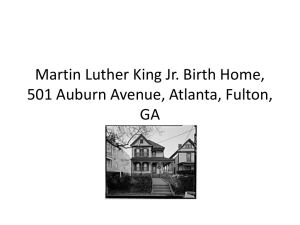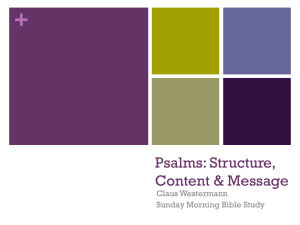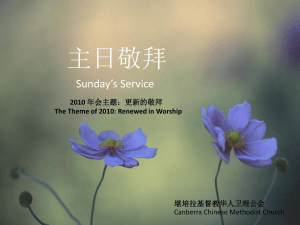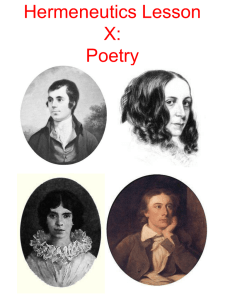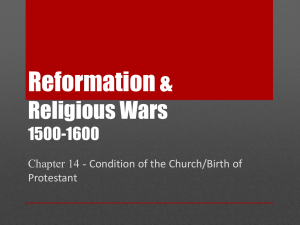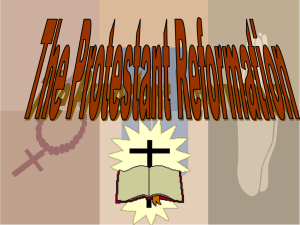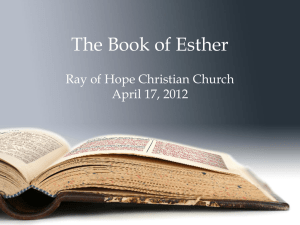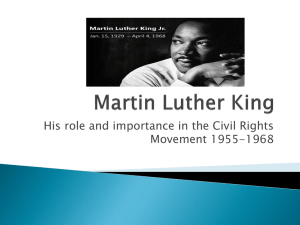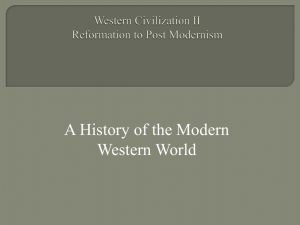Martin Luther as Interpreter of the Psalms
advertisement
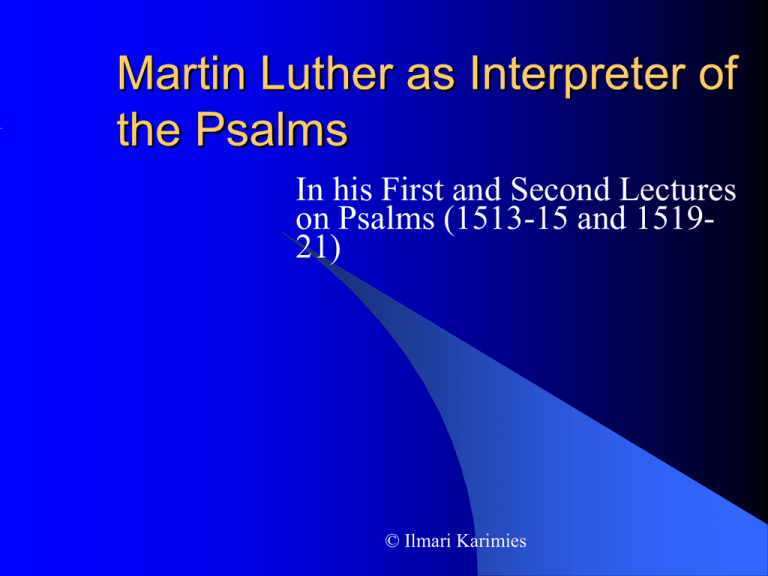
Martin Luther as Interpreter of the Psalms In his First and Second Lectures on Psalms (1513-15 and 151921) © Ilmari Karimies Young Luther and the Psalms Dictata super Psalterium (1513-15) WA 3 and 4 The Seven Penitential Psalms in German, 1517 Operationes in Psalmos (1519-21) WA 5 Dictata super Psalterium A selection of psalms Glossae, defining words grammatically Scholia, interpretation of the meaning of the verse Quadriga: sensus litteralis vs. spiritualis Three spiritual senses: allegorical, tropological, anagogical The spiritual senses of the text Allegory: Old testament pointing to Christ Tropology or moral sense: How to act, examples of conduct Anagogy: Eternal significance ” The Letter speaks of deeds; Allegory to faith; the Moral how to act; Anagogy our destiny ” The significance of Dictata In Dictata Luther often follows the medieval tradition Luther: ”Litteral sense is primary”. However, the litteral sense is the christological sense Psalms are a labyrinth, where Christ is to be found Cannot be used as a source for genuinely ’Lutheran’ theological thought However, the lectures are an important source on the developement of Luther’s earliest thinking Operationes in Psalmos Exposition of psalms 1 to 22 The other major lectures on Psalms Written and held during the heated early phases of reformation (1519-21), along the three major reforming treatises Important source on the Theology of the Cross Commentary of Ps. 22 finished in Wartburg Luther’s exegetical method in Operationes The division to glossae and scholia is no longer in use Often Luther first defines the meaning of the words from Hebrew and Latin Single verses are understood in the light of the overall meaning of the Psalm Spiritual and litteral sense are used, but the threefold division of spiritual meaning very rarely Psalms as inspired scripture ”However it should be noted, that the words of the psalm are words of faith, that they do not speak of men according to what one sees on the outside.” (WA 5, 30, 16-18) ”I say that the prophet speaks in spirit, so he should be listened to in spirit” (WA 5, 44, 31) ”These words should be listened to in spirit and in faith, as all words of God” (WA 5, 132, 27-28) ”That is why I have said: The eyes and ears of faith are necessary, in order to hear these words of spirit and see their content. Human being can not understand them.” (WA 5, 31, 11-12) Understanding the inspired scripture Luther often refers to the psalms as ”words of spirit” or ”words of faith”, and to the psalmist as ”prophet”. According to Luther, there is a spiritual meaning in the psalms, which is accessible only to faith Luther speaks of ”eyes of faith” and ”ears of faith”, which grasp the spiritual meaning Luther thinks that experience is necessary to understand this meaning Example: Ps. 1:1 ”Blessed is the man who walks not in the counsel of the ungodly” Luther speaks about two kinds of blessedness: external and internal. He makes a division between ungodly, who have and seek external blessedness, piety and great pomp, and the godly,who suffer outwardly, but stay steadfast in the law of God. Ungodly take pride in their works and give counsel to others, leading them to peril ”Nor stand in the way of sinners, nor sit in the seat of the scornful” Ungodly do good works without faith, and make their ungodliness persistent by relying on the works Those sit on the seat of the scornful, who fill the church with ideas of philosophers, but neglect the word of God ”2. But his will is in the Law of the Lord, and on His Law he meditates day and night.” The Law of Lord is good, but people replace it with their own traditions The will of the person is the root of all his actions. The right will, right love, is the gift of the Holy Spirit through Jesus Christ Without this love, the law can only be filled in outward ways, and it becomes a heavy burden. This is the way the ungodly follow the law. Contrary to them, those who have this love, gladly hold the law of the Lord in their hearts night and day ”3. He is like a tree planted by streams of water, that yields its fruit in its season.” The tree is probably a palm, living in the desert, which signifies lack of wordly prosperity The waters are the grace of God, which water the tree The blessed man does not live for himself, but serves his neighbours bringing fruit for others ”In its season” means at all opportunities and at every situation. This is contrary to the ungodly, who have fixed times for doing good ”And its leaf does not wither” Leaves mean doctrine. The doctrine of the ungodly withers. Fruit was mentioned before leaf: the godly bring forth good deeds before doctrine The tree can be an image of an individual, or also of the whole Church ”In all that he does, he prospers” The palm tree grows upwards under the weight of the fruits; likewise the Church grows under the weight of oppression The prosperity must therefore be understood spiritually The Church prospers, when it is poor and persecuted, but weakens, if it is rich and wordly prosperous ”4. Not so are the ungodly” Always fear these words, so that also you would not be found ungodly The ungodly apply all pleasant words to themselves, and unpleasant to others Only by hoping to the mercy of God can you attain the good ”But are like the dust which the wind drives away from the face of the earth.” The ungodly are driven around by many kinds of whirlwinds, false doctrines which give no rest for conscience ”5. Therefore the wicked will not stand in the judgement, nor sinners in the congregation of the righteous.” This does not mean resurrection, but that the ungodly cannot stand before the face of God The ungodly cannot have respected authority in the Church, their authority can only be formal ”6. For the Lord knows the way of the righteous, but the way of the wicked will perish.” The prosperity of the wicked has grown to such amounts, that in the eyes of men it seems eternal. Nevertheless, it will perish when they least expect Instead of external prosperity, the pious must seek the way of the cross, which is a way of faith, not seeing In the best way the wickedness is driven away, when the ungodly is made godly by love, prayer and teaching the word of God If somebody does not accept this interpretation of the hidden prosperity, Luther says he can also apply the psalm to heretics (and jews), who are excommunicated Instructions to reading psalms At the end of Ps. 1 Luther gives general instruction to reading all psalms: ”…we should adapt and adjust our minds and feelings, so that are in accord with the sense of the psalms. For since the psalter is only a kind of school and exercise for the disposition of the heart, he sings in vain who does not sing in the spirit.” Instructions continued ”When you therefore read: ’Blessed is the man, who does not walk in he counsel of the ungodly,’ it should at the same time move you to detest and despise the counsel of the ungodly, not only for yourself, but in general, for the whole church.” Instructions continued ”So when you say: ’But their will is in the Law of the Lord’, you should not rest assured and pat yourself on the back, as if you were one who loves the Law of God. Rather you should sigh with the greatest possible ardor to Him alone who has come to send fire upon the earth (Luke 12:49). As long as you live, think of yourself in no other way than as one who does not yet love God’s Law and who desperately needs this desire for the Law.” Instructions continued ”First practise on one psalm, even one little verse of the psalm. You will progress enough if you learn to make only one verse a day, or even one in a week, live and breathe in your heart. After this beginning is made, everything else will follow, and you will have a rich treasury of understanding and affection. Only see that you do not let weariness and discouragement scare you out of beginning it.” Instructions continued ” For this is truly to sing the psalms, or as the Scriptures say of David, to strike the harp with the hand. For the fingers of the harpist are the emotions of the heart moving about in words of the psalms. Without this the strings do not sound, and the psalm is not sung, because it is not touched. …I know whoever becomes practised in this will find more by himself in the Psalter than all the interpretations of other men can give him.” (WA 5, 46, 15 – 47, 13) Conclusions Luther interpretes the psalms quite freely to apply them to his own historical situation According to him, such concepts as godliness and ungodliness remain in their essence the same throughout the times, and therefore the psalms can allways be applied in this way However, Luther thinks it is very important to apply the psalms first and foremost to one’s own life, and only second to others


